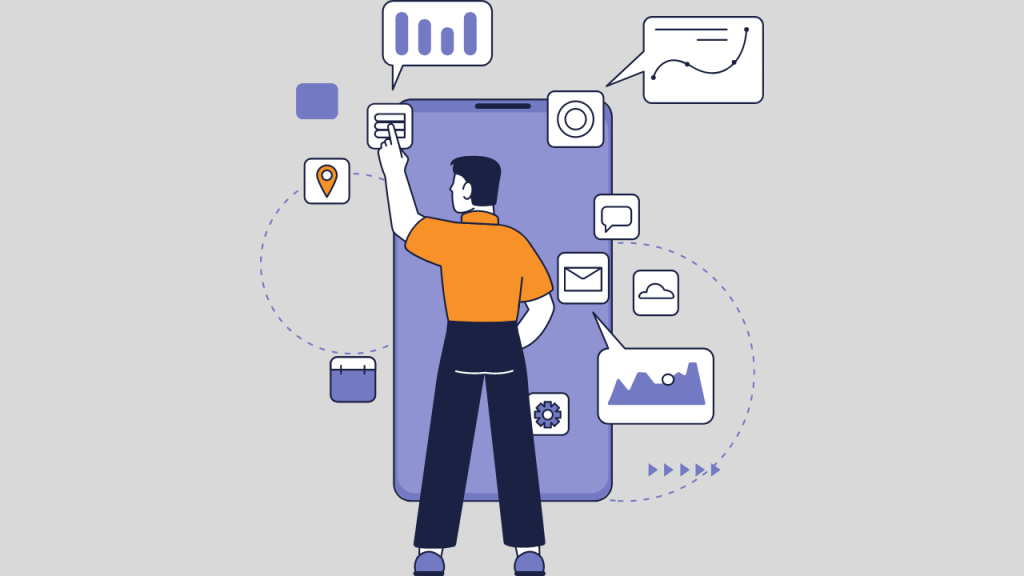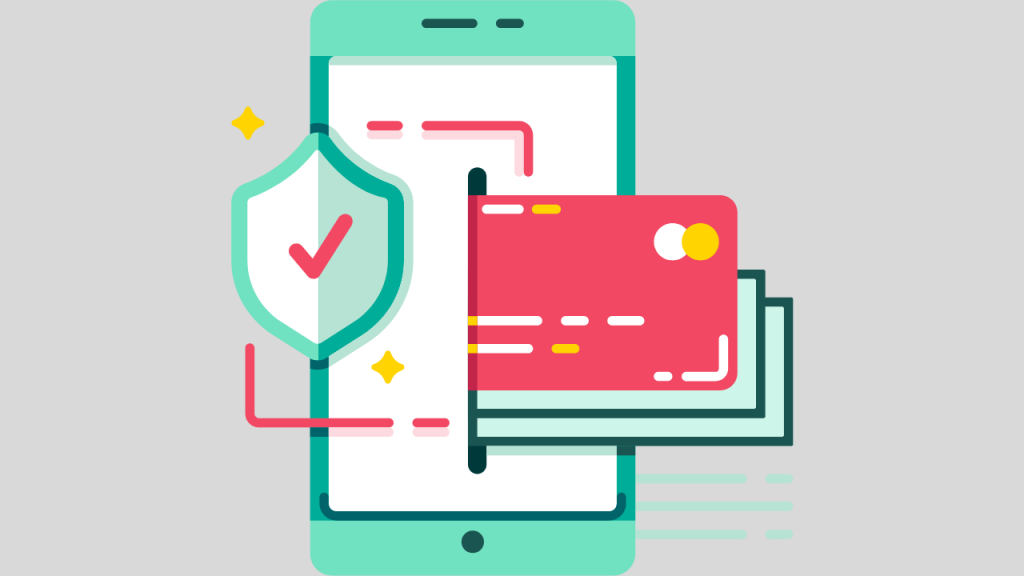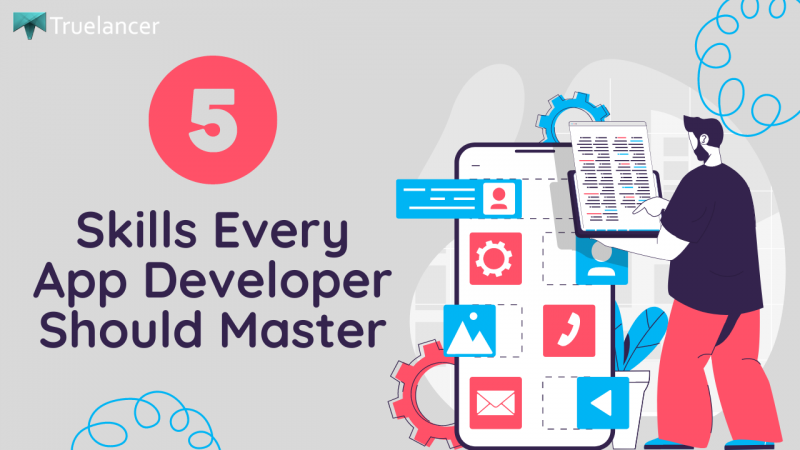5 Essential Skills Every Mobile App Developer Should Master
Did you know that there are over 2.87 million apps available for download on the Google Play Store alone? Mobile apps have revolutionized the way we communicate, work, shop, and entertain ourselves. Behind every successful app, there’s a talented mobile app developer who has mastered a unique set of skills. In this fast-paced and ever-evolving digital era, mobile app developers are the architects of our digital experiences.
But what sets apart an exceptional mobile app developer from the rest? It goes beyond mere coding expertise. It’s about understanding the intricate dance between technology and user experience, navigating the complex world of security and privacy, and adapting to the ever-changing mobile landscape.
In this blog, we will explore five essential skills that every mobile app developer should master to succeed in their career.
What is a mobile app developer?
A mobile app developer is a skilled professional who designs, develops, and maintains mobile applications. They possess expertise in programming languages, UI/UX design, and app security, creating user-friendly and secure apps for smartphones and tablets. They continuously update their skills to adapt to the ever-changing mobile app development landscape.
Mastering Mobile App Development Fundamentals
To build a strong foundation as a mobile app developer, it is vital to grasp the fundamentals of app development:

Proficiency in Programming Languages for App Development
Proficiency in programming languages such as Java, Swift, or Kotlin is crucial for mobile app development. Understanding the syntax, logic, and best practices of these languages enables developers to write efficient and maintainable code.
Understanding Mobile App Architectures and Patterns
Knowing various mobile app architectures (e.g., MVC, MVVM) and design patterns (e.g., Singleton, Observer) empowers developers to create scalable, modular, and well-structured apps. This understanding facilitates easier maintenance and enhances collaboration with other developers.
ALSO READ: 10 App Development Tools That Every Freelancer Should Know
Familiarity with Operating Systems (iOS and Android)
Mobile app developers should have a solid understanding of both iOS and Android operating systems. This includes knowing the platform-specific guidelines, design principles, and development tools. It enables developers to optimize the user experience and create apps that seamlessly integrate with each platform.
Designing Engaging User Experiences for Apps
User interface (UI) and user experience (UX) design are crucial aspects of mobile app development that directly impact user satisfaction:

User Interface (UI) Design Principles and Best Practices
Developers need to understand the principles of effective UI design, including creating intuitive layouts, utilizing consistent branding elements, and optimizing usability. A visually appealing and user-friendly interface enhances the overall experience of the app.
User Experience (UX) Research and Analysis Techniques
Mastering UX research techniques, such as user surveys, interviews, and usability testing, helps developers gain valuable insights into user preferences and behaviour. By analyzing this data, developers can make informed decisions to improve the app’s usability and engagement.
Prototyping and Wireframing for App Design
Proficiency in prototyping and wireframing tools allows developers to create interactive mockups of app interfaces. Prototypes enable early feedback from stakeholders and users, ensuring the final product meets their expectations and drives positive user experiences.
ALSO READ: App Development Best Practices for Freelancers
Ensuring App Security and Data Privacy
In an era of increasing data breaches and privacy concerns, app security and data protection are of paramount importance:

Implementing App Security Best Practices
Mobile app developers must be well-versed in implementing security measures such as secure authentication, encryption, and secure data transmission. Understanding common security vulnerabilities and employing best practices safeguards user data and builds trust.
Encryption and Secure Data Storage Methods
Developers should possess knowledge of encryption algorithms and techniques to protect sensitive data within the app. Employing secure data storage methods, such as using encrypted databases or keychain services, ensures the confidentiality and integrity of user information.
Complying with Data Privacy Regulations
Adhering to data privacy regulations, such as the General Data Protection Regulation (GDPR) or the California Consumer Privacy Act (CCPA), is essential. Developers should understand the legal requirements and implement the necessary measures to handle user data responsibly.
Cross-Platform Development and Optimization
Developers who can create apps that run seamlessly across multiple platforms have a competitive edge:

Frameworks for Cross-Platform App Development
Being familiar with frameworks like React Native, Flutter, or Xamarin allows developers to write code once and deploy it on multiple platforms. This approach significantly reduces development time and effort, making it easier to reach a broader audience.
Maximizing Code Sharing and Reusability
Efficiently leveraging code sharing and reusable components helps streamline the development process. By abstracting common functionalities into reusable modules, developers can reduce code duplication and ensure consistent app behaviour across platforms.
Testing and Debugging Strategies for Multiple Platforms
Testing and debugging apps across various platforms can be challenging. Developers need to understand platform-specific testing tools and techniques to identify and fix issues effectively. This ensures the app’s stability and functionality across different devices and operating systems.
Continuous Learning and Growth as an Mobile App Developer
To thrive in the fast-paced world of mobile app development, developers must embrace a mindset of continuous learning and adaptability:

Staying Updated with Mobile Technologies and Trends
Mobile app development is ever-evolving, with new technologies and trends emerging regularly. Developers should proactively stay informed about the latest advancements, frameworks, and industry best practices. This enables them to leverage new tools and techniques to enhance their app development process.
Exploring New Programming Languages and Frameworks
Learning new programming languages and frameworks expands developers’ skill sets and widens their range of possibilities. For example, exploring languages like Swift for iOS or Kotlin for Android can improve app performance and unlock additional platform-specific features.
Problem-Solving and Troubleshooting Skills for App Development
Mobile app development often involves encountering complex problems and bugs. Sharpening problem-solving and troubleshooting skills helps developers efficiently diagnose issues and find effective solutions. Strong analytical thinking and attention to detail are key in resolving challenges encountered during the development process.
Conclusion:
Mastering the essential skills outlined in this blog post is vital for mobile app developers to build successful and impactful applications. By honing their programming expertise, design capabilities, security awareness, cross-platform development skills, and commitment to continuous learning, developers can position themselves for long-term success in this dynamic field. Embrace these skills, stay curious, and embrace the ever-changing landscape of mobile app development to stand out as a proficient and sought-after app developer.
